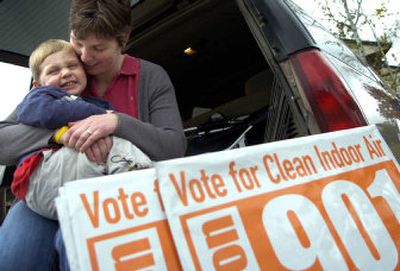Smoking ban goes to voters

For the second time this year, the debate over smoking cigarettes in indoor places has ignited. This time, it’s voters, not legislators, who will decide the issue Nov. 8.
Initiative 901 would ban smoking inside bars, restaurants, mini-casinos, bowling alleys and roller rinks as well as outside those businesses’ doors, windows and ventilation systems. The initiative pits clean-air advocates against property rights proponents and smokers against those who don’t, although even some who light up say it’s time to clear the air.
“It wouldn’t bother me if it went through because I plan on quitting soon,” said steelworker Steve Bussiere, 27, between drags at The Swinging Doors bar in Spokane. His wife, Sarah Bussiere, said she wouldn’t mind stepping outside—even 25 feet from the building, as the law would require—for a smoke.
But across the bar at the pull tabs, customer Scott Lonyo, 47, said I-901 would strip business owners of their rights and their revenues.
“A lot of taverns will lose money,” he predicted.
If the initiative passes, Lonyo said he’ll drink, smoke and gamble at tribal casinos, where the rules wouldn’t apply. I-901 opponents said that’s what happened when Pierce County briefly banned smoking in bars last year.
But to 25-year-old Christine Plank, fighting for the right to smoke in a bar is trivial. What matters to the North Spokane mom is being able to celebrate her son Avery’s fourth birthday with him next year.
Plank was diagnosed with lung cancer a year ago, despite never being a smoker or being around secondhand smoke. She supports I-901 because she doesn’t want servers, diners or anyone else to experience what she has—the removal of part of one lung, chemotherapy and a bleak prognosis.
“I pray that it (I-901) passes,” Plank said in her apartment’s kitchen.
Nancy McDaniel shares Plank’s view.
McDaniel owns Northwest Hospitality LLC, which operates nine Perkins restaurants in the Spokane area and in Idaho. McDaniel’s husband, John McDaniel, testified last winter in Olympia when the Legislature considered two bills banning smoking.
During the last decade, their restaurants went smoke-free because of complaints from nonsmoking customers to lessen the wear on their buildings and “because it was the right thing to do,” Nancy McDaniel said.
Then John McDaniel was diagnosed with lung cancer. The 50-year-old marathoner didn’t smoke but was exposed to it secondhand during his 30 years in the restaurant business.
John McDaniel died April 11. The bills never became law.
Dave Wilkinson, spokesman for the No on 901 campaign, warned that people ignore the role that heredity, not secondhand smoke, plays in causing cancer. And he said the workers and patrons in smoky restaurants and bars are there by choice.
“I don’t believe there are many people out there that are around secondhand smoke that don’t want to be around it,” he said.
Bottom line: I-901 threatens property rights and could lead to other restrictions, he said.
“Should we ban deep-fried food? Should we ban Big Macs?” he asked. “Should people smoke? Probably not, but I have a real issue with a visitor to somebody’s property, when their right supersedes that of the property owner.”
Bob Materne is one such property owner. The reader board outside The Swinging Doors urges voters to defeat I-901. He estimates 60 percent of his restaurant customers smoke, while 85 percent of his pull-tab customers do. It’s the latter group he’s most worried will take their business—and 20 percent of his revenues—to the tribal casinos.
And while he might have to lay off a dozen of his 50 workers if that happens, he’s concerned small taverns that don’t have a full food menu will suffer more.
“Those people have beer, they have gambling and they have smoking,” Materne said. “That’s all the taverns have.”
I-901 opponents say it’s dangerous to ask someone to step 25 feet from a bar at night, and enforcing the distance requirement in downtown areas, where a smoker might walk past the doorways of five restaurants in one block, would be impossible.
But Nancy McDaniel, of the Perkins restaurants, called the 25-foot rule “perfectly reasonable.”
“To have people standing outside the door smoking makes no sense at all if we say we’re nonsmoking,” she said.
I-901 supporters planned to launch a television advertising campaign this week. They have raised $1.17 million, with top contributions coming from the American Cancer Society, the Campaign for Tobacco-Free Kids and the AARP, formerly the American Association of Retired Persons.
The initiative’s foes have raised $19,165 and don’t plan to air ads.
Bar patron Lonyo doesn’t need a commercial to tell him that banning smoking would make him feel unwelcome in his favorite watering holes.
“When I go out and spend my money, I want to be comfortable,” he said.
On that, both sides agree.